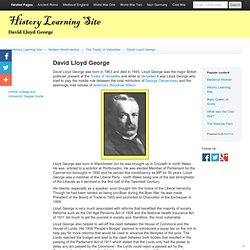

David Lloyd George. David Lloyd George was born in 1863 and died in 1945.

Lloyd George was the major British politician present at the Treaty of Versailles and while at Versailles it was Lloyd George who tried to play the middle role between the total retribution of George Clemenceau and the seemingly mild rebuke of America’s Woodrow Wilson. Lloyd George was born in Manchester but he was brought up in Criccieth in north Wales. He was articled to a solicitor at Porthmadoc. He was elected Member of Parliament for the Caernarvon boroughs in 1890 and he served this constituency as MP for 55 years. Versailles Treaty. The Impact of the Treaty of Versailles. Introduction to the First World War - How the War Started. The First World War started in August 1914.

It would last for more than four years, and kill about nine million people in uniform. In the same time period the war and other violent conflicts would kill an estimated twenty million civilians. The world would never be the same. Tensions in Europe The major powers in Europe had been preparing for war for years. Arms races to build bigger and more powerful armies and navies;Growing disputes over trade and land;Dissatisfaction with the balance of power in Europe;Resentment from the legacy of past grievances.
Alliances and Treaties Divided Europe. Causes of World War One. The first world war began in August 1914. It was directly triggered by the assassination of the Austrian archduke, Franz Ferdinand and his wife, on 28th June 1914 by Bosnian revolutionary, Gavrilo Princip. This event was, however, simply the trigger that set off declarations of war. The actual causes of the war are more complicated and are still debated by historians today. Click on the topics below to learn more about what caused World War One. Alliances Imperialism Militarism Nationalism Crises Alliances An alliance is an agreement made between two or more countries to give each other help if it is needed.
A number of alliances had been signed by countries between the years 1879 and 1914. Top Imperialism Imperialism is when a country takes over new lands or countries and makes them subject to their rule. Click map to enlarge Militarism Militarism means that the army and military forces are given a high profile by the government. Nationalism Top Crises Moroccan Crisis Bosnian Crisis Activities. Feature Articles - The Causes of World War One. June 28 in Sarajevo We'll start with the facts and work back: it may make it all the easier to understand how World War One actually happened.

The events of July and early August 1914 are a classic case of "one thing led to another" - otherwise known as the treaty alliance system. The explosive that was World War One had been long in the stockpiling; the spark was the assassination of Archduke Franz Ferdinand, heir to the Austro-Hungarian throne, in Sarajevo on 28 June 1914. (Click here to view film footage of Ferdinand arriving at Sarajevo's Town Hall on 28 June 1914.) Ferdinand's death at the hands of the Black Hand, a Serbian nationalist secret society, set in train a mindlessly mechanical series of events that culminated in the world's first global war. Austria-Hungary's Reaction Austria-Hungary's reaction to the death of their heir (who was in any case not greatly beloved by the Emperor, Franz Josef, or his government) was three weeks in coming.
One Thing Led to Another. The Treaty of Versailles. The Treaty of Versailles was the peace settlement signed after World War One had ended in 1918 and in the shadow of the Russian Revolution and other events in Russia.

The treaty was signed at the vast Versailles Palace near Paris - hence its title - between Germany and the Allies. The three most important politicians there were David Lloyd George, Georges Clemenceau and Woodrow Wilson. The Versailles Palace was considered the most appropriate venue simply because of its size - many hundreds of people were involved in the process and the final signing ceremony in the Hall of Mirrors could accommodate hundreds of dignitaries. Many wanted Germany, now led by Friedrich Ebert, smashed; others, like Lloyd George, were privately more cautious. World War One had left Europe devastated. Those who had fought against the Allies suffered heavy casualties as well: The total deaths of all nations who fought in the war is thought to have been 8.5 million with 21 million being wounded. Territorial 1. 3.